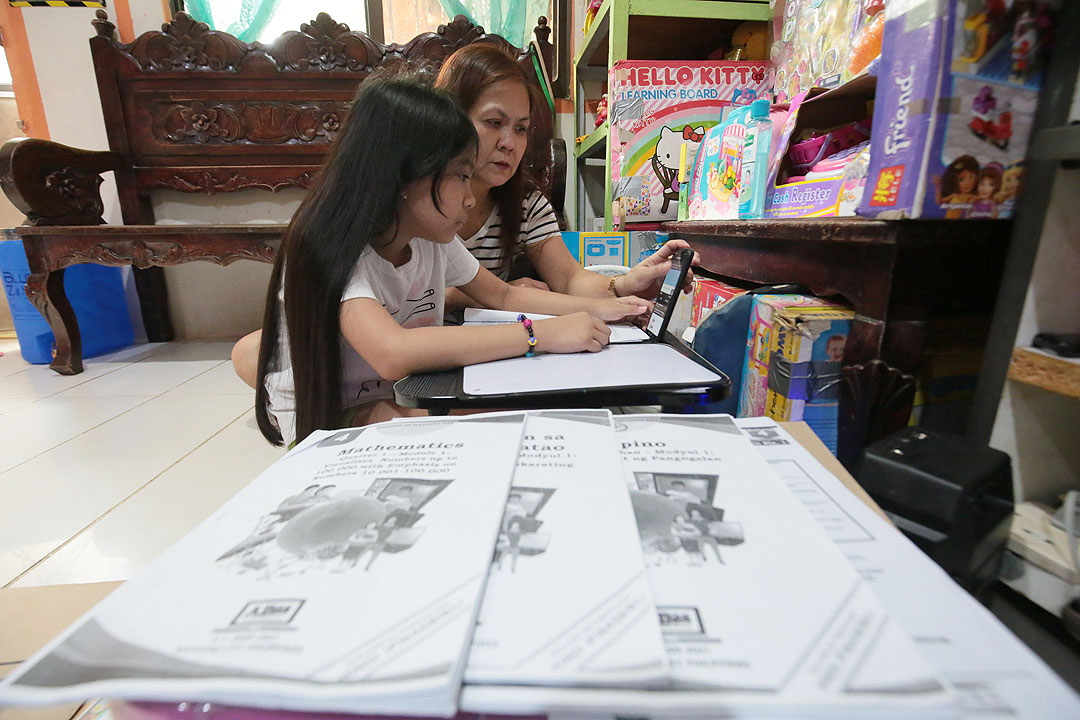
By Kyle Aristophere T. Atienza, Reporter
PHILIPPINE President Rodrigo R. Duterte has approved a pilot test of limited in-person classes in areas with a low number of coronavirus disease 2019 (COVID-19) cases.
Education Secretary Leonor M. Briones said in a televised briefing that only 100 public schools and 20 private institutions will participate in the pilot test.
Ms. Briones said the pilot test will be done in low-risk areas based on the Department of Health’s (DoH) criteria and which have passed the safety assessment of the Education department.
Face-to-face learning will be limited to three to four hours and will require written consent from parents of the students, she added.
The pilot test will be conducted with a combination of face-to-face classes in school and distance learning for two months. In-person classes will be conducted half-day every other week.
Class size will be limited to 12 students in kindergarten, 16 in grades 1-3, and 20 at senior high school level, the Education department said.
Ms. Briones emphasized that “very strict” health standards will be observed during the pilot test which will begin as soon as possible.
“If there are changes in the risk assessment, then we will stop it,” she said.
The Philippines is one of 17 countries that have kept schools fully closed since the pandemic began, according to a report released by the United Nations children’s agency. UNICEF has pushed for a phased reopening of schools, beginning in low-risk areas, noting that the right to learn of over 27 million Filipino students has been affected.
Last year, Mr. Duterte turned down a proposal to hold the pilot test as the Philippines fought a coronavirus surge that almost paralyzed its healthcare system.
In June, the President also rejected a similar proposal as the country had yet to vaccinate most of its adult population.
“I cannot gamble on the health of children,” Mr. Duterte said three months ago.
HEALTH CONCERNS
The reopening of schools comes as the Philippines is battling a sustained surge in COVID-19 cases. The Health department reported 18,937 new COVID-19 cases on Monday, bringing the active cases to 176,850 nationwide.
“The pilot was approved for ‘low-risk areas’ to be determined by DoH but just in this aspect, how will DoH ascertain which areas are truly low-risk if testing is still insufficient in capacity and inequitable in distribution?” said Joshua L. San Pedro, convenor of the Coalition for People’s Right to Health, in a Facebook message.
Citing DoH data, Mr. San Pedro said more than 30 provinces in the country still do not have testing laboratories, while majority of the 280 accredited laboratories are in urban areas or city centers.
“The question is are they low-risk because they truly have low prevalence of COVID-19, or simply because there is a low number of cases being detected?” the medical doctor asked.
Mr. San Pedro said the government also needs to boost its vaccination drive and prioritize education workers to prevent community transmission.
The Department of Education’s (DepEd) Ms. Briones said teachers participating in the pilot run would not be required to be fully vaccinated.
Last week, DepEd said about 40% of its teaching and non-teaching personnel have been inoculated against the coronavirus.
Mr. San Pedro said there must also be a mass hiring of school nurses and physicians to ensure the safety of students and school personnel. “This is much more important than relying merely on physical distancing and vaccination protocols.”
“First and foremost, there needs to be an increase in school health capacity and workforce in order to monitor and ensure health and safety protocols,” Mr. San Pedro said. “As it stands, school nurses are hired at the district level, instead of a school level.”
“With the pandemic still in community transmission, we cannot afford that these school health professionals are only present in the schools certain times a week.”
Mr. Duterte’s economic planners have said that the prolonged closure of schools could lead to about 11 trillion in productivity losses in the next four decades.
The President’s approval of the dry run is “a welcome development,” ACT Teachers Rep. France L. Castro said in a statement.
“The DepEd must now ensure that those schools where the pilot face-to-face classes would happen would have adequate facilities and health protocols in place,” Ms. Castro said.
For all the latest Business News Click Here
For the latest news and updates, follow us on Google News.
